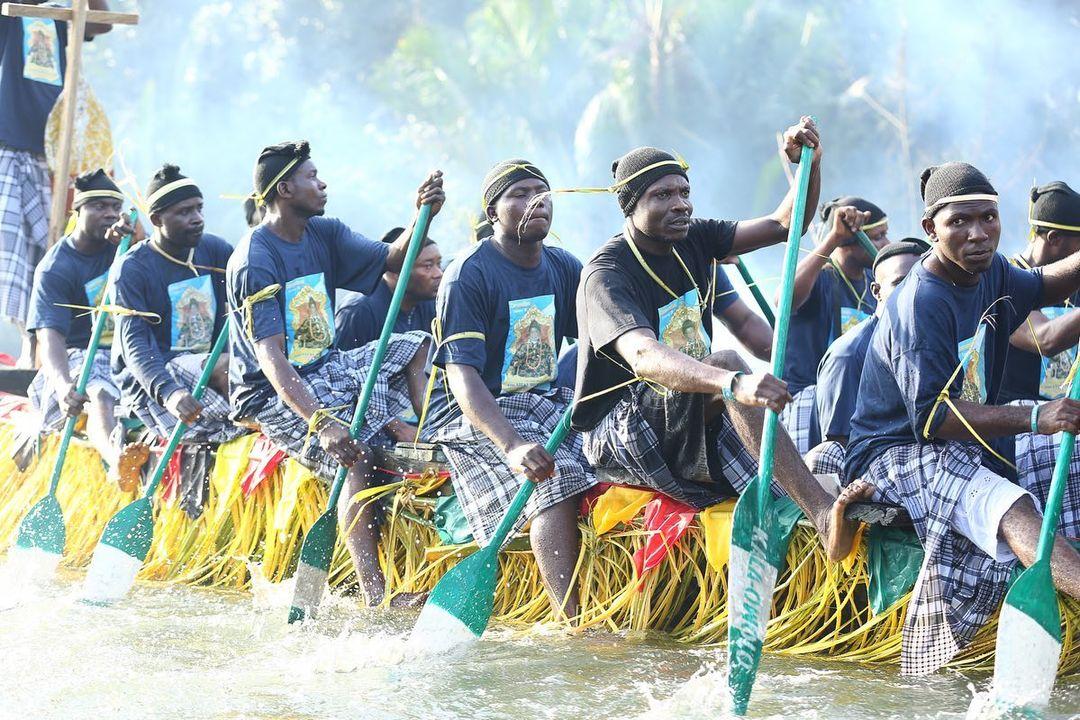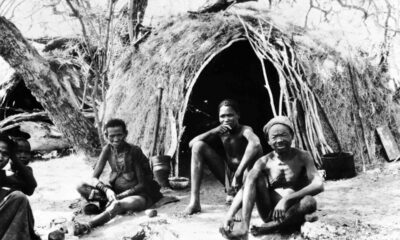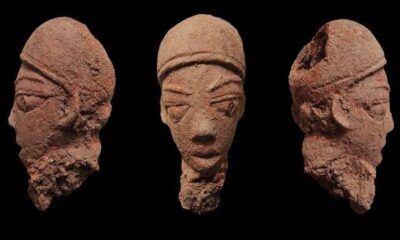ARTS & CULTURE
Ijaw Proverbs: A Window Into Tradition, Wisdom, And Culture
Published
11 months agoon
By
wpadminee
Ijaw Proverbs are the timeless treasures of culture. They encapsulate the wisdom, beliefs, and values of a community. Among the Ijaw people of the Niger Delta region, proverbs hold a special place in everyday communication. They are vessels of ancestral knowledge and social guidance.
In this article, we delve into the world of Ijaw proverbs, exploring their significance, themes, and cultural context.
Introduction to the Ijaw people
The Ijaw people, also known as the Izon, are one of the largest ethnic groups in Nigeria, primarily inhabiting the coastal regions of the Niger Delta.
With a rich history steeped in fishing, farming, and trade, the Ijaw have preserved their cultural heritage through language, rituals, and oral traditions. Central to these traditions are proverbs, which play a vital role in communication, education, and social cohesion.
The significance of Ijaw proverbs in Ijaw culture
In Ijaw society, proverbs serve multifaceted purposes, ranging from communication to entertainment, moral instruction, and conflict resolution. They are passed down from generation to generation, ensuring the preservation of cultural identity and knowledge.
Ijaw proverbs are often used in everyday conversations, ceremonies, storytelling, and traditional songs, enriching the fabric of community life.
Themes in Ijaw proverbs
Ijaw proverbs cover a wide range of themes that reflect the values, experiences, and worldviews of the people. Some common themes include:
Wisdom and knowledge
Many Ijaw proverbs impart timeless wisdom and insights into human behaviour, relationships, and societal norms. For example, “A bird does not fly so high that the hunter cannot shoot it” underscores the importance of humility and caution in the face of danger.
Community and unity
Proverbs emphasising the strength of unity and cooperation are prevalent in Ijaw culture. “When brothers fight to the death, a stranger inherits their father’s property” highlights the destructive consequences of internal conflict and the need for harmony within families and communities.
Nature and environment
As a people deeply connected to their natural surroundings, Ijaw proverbs often draw inspiration from the environment. “A tree does not make a forest” emphasises the collective effort needed to achieve significant goals. This mirrors the interconnectedness of ecosystems and human society.
Resilience and adaptability
Given their history of overcoming adversity and environmental challenges, Ijaw proverbs celebrate resilience and adaptability. “When a tree falls, the birds scatter” acknowledges the inevitability of change and the need to adapt to new circumstances.
5 Ijaw proverbs and their meanings
1. “Mèn wàrà fín, fín ébè pèrè.”
“When the water recedes, the fish trap is exposed.”
This proverb illustrates the idea that hidden truths or secrets are revealed when difficult times pass. Just as the receding water exposes the fish trap, challenges or obstacles can reveal hidden aspects of a situation or individual.
2. “Á dí èèrè, mèn fí di àrè.”
“One who sows in haste will reap in hunger.”
This proverb emphasises the importance of patience, diligence, and careful planning in achieving long-term success. Rushing through tasks or decisions without proper consideration can lead to negative consequences and unfulfilled desires.
3. “Ì kè gbòpèrè àghòpè ì ní dí bòròbòrò.”
“The river that forgets its source will dry up.”
This proverb highlights the significance of remembering and honouring one’s origins, heritage, and ancestral wisdom. Just as a river depends on its source for sustenance, individuals who disregard their roots risk losing their identity and connection to their community.
4. “Ì wàrà è rípè, è sí è lè rípè è ní gbónù gbónù.”
“The palm wine tapper climbs high, but when he falls, he falls heavily.”
This proverb warns against arrogance, overconfidence, and the dangers of pride. It suggests that those who attain success or ascend to high positions should remain humble and mindful of the potential consequences of their actions, as a fall from a great height can be especially painful.
5. “À tòrò tènè, mèn kè bò, mèn gbá tènè.”
“The rope of a canoe never breaks when it is in the hands of those who know how to paddle.”
This proverb underscores the importance of competence, skill, and experience in achieving success and overcoming challenges. It implies that individuals who possess the necessary knowledge and expertise are better equipped to navigate life’s obstacles and steer towards their goals effectively.
Preservation and revitalization efforts
While Ijaw proverbs continue to thrive in oral tradition, modernization and globalisation pose challenges to their preservation. Efforts are underway to document and archive these proverbs, ensuring their accessibility to future generations.
Additionally, cultural festivals, educational programmes, and community initiatives play a crucial role in revitalising the use of proverbs and promoting cultural pride among the youth.
In conclusion…
Ijaw proverbs are not merely linguistic expressions but repositories of culture, wisdom, and identity. They reflect the resilience, values, and collective wisdom of a people deeply rooted in tradition yet adaptable to change.
By cherishing and preserving their proverbs, the Ijaw community sustains a vital link to its past while navigating the complexities of the modern world. As guardians of this rich oral tradition, the Ijaw people continue to inspire generations with the timeless wisdom encapsulated in their proverbs.
Check out more here.
ARTS & CULTURE
Ijele Masquerade: The “King Of Masquerades” In Igbo Land
Published
3 months agoon
December 21, 2024By
wpadminee
The Ijele Masquerade, often referred to as the “King of Masquerades,” holds a revered position in Igbo culture. It is not only the largest masquerade in Africa but also a symbol of unity, spirituality, and cultural identity among the Igbo people.
Its towering presence, vibrant artistry, and profound symbolism make it a centrepiece of Igbo traditions.
The Ijele Masquerade originated in southeastern Nigeria, particularly in Anambra and Enugu states. Oral traditions trace their roots to the Akwunechenyi dance group in Umueri.
It began as a celebratory and protective figure, initially created to intimidate invaders and celebrate royalty. Over time, it evolved into a cultural icon representing greatness and the Igbo people’s connection to their ancestors.
Standing between 12 and 15 feet tall, the Ijele Masquerade is a marvel of craftsmanship. It is constructed from bamboo, colourful fabrics, and intricate carvings.
Its structure is divided into two segments: the upper (Mkpu Ijele) and the lower part (Akpakwuru Ijele), separated by a symbolic python figure, Eke-Ogba.
This design signifies the balance between the spiritual and earthly realms. The preparation of the masquerade requires extensive collaboration, with over 100 men working for six months to complete its elaborate design.
Cultural and Spiritual Significance of Ijele Masquerade
The Ijele Masquerade embodies the collective spirit of the Igbo community. It is a representation of the ancestors’ guidance, protection, and blessings.
Traditionally performed during festivals, burials, and special ceremonies, the Ijele is believed to have spiritual powers, such as warding off evil spirits, promoting fertility, and bringing healing.
Its performance is both a spectacle of entertainment and a deeply spiritual ritual that connects the living to their heritage.
The Ijele Masquerade is a highlight of Igbo cultural festivals, often serving as the grand finale. Accompanied by music, drumming, and traditional dances, its performance captivates audiences with its grandeur and artistry.
These events also serve as a platform for preserving and promoting Igbo heritage, attracting tourists, and generating economic benefits for the community.
Challenges Facing Ijele Masquerade
Despite its cultural significance, the Ijele Masquerade faces challenges in the modern era. Urbanisation, globalisation, and declining interest among younger generations threaten its preservation.
The elaborate nature of its preparation also requires significant funding and resources, which are often scarce. Additionally, cultural appropriation by outsiders risks diluting its authenticity and significance.
Efforts to preserve the Ijele Masquerade have gained international recognition. In 2009, UNESCO listed it as an intangible cultural heritage in need of safeguarding.
This recognition highlights the importance of supporting local communities to maintain their traditions. Advocacy for funding, education, and tourism initiatives is vital to ensuring the continuity of this cultural treasure.
A Symbol of Igbo Identity
The Ijele Masquerade remains a powerful symbol of Igbo identity and resilience. It is a testament to the creativity, spirituality, and unity of the Igbo people.
As it continues to inspire pride and admiration, the Ijele Masquerade underscores the importance of preserving cultural heritage in a rapidly changing world.
By supporting initiatives that promote Ijele, individuals and organisations can help sustain this remarkable tradition for future generations.
Its legacy is not only a source of pride for the Igbo people but also a significant contribution to the global appreciation of cultural diversity.
For further details about the Ijele Masquerade, see sources like UNESCO’s Intangible Cultural Heritage listing and articles exploring its cultural significance.
Read more on culture here.
ARTS & CULTURE
Does Anklet Really Signify Promiscuity?
Published
4 months agoon
December 7, 2024By
wpadminee
What is an anklet?
An anklet is a versatile piece of jewellery that women typically wear around their ankles. Crafted from materials like chains, beads, or a mix of both, anklet meanings vary across cultures and styles.
Many fashionable women choose anklets to make a bold style statement, embracing their elegance and charm.
In Nigeria, people often call this accessory a “leg chain” or “ankle chain,” reflecting its cultural relevance. In pop culture, it’s popularly known as an “ankle bracelet.”
Anklets here focus more on fashion than symbolism, though interpretations can differ. With various styles and intricate designs available, anklets offer countless aesthetic options, allowing women to showcase their personal flair.
Ultimately, anklet meanings can be deeply personal, influenced by tradition, culture, or simply individual taste.
Cultural and Historical Significance
Throughout history, anklets have held different meanings across various cultures. While some view them as mere adornments, others have associated them with deeper, sometimes controversial, connotations.
In some societies, ancient and modern, anklets symbolise promiscuity.
Early Usage in Ancient Civilisations
Egypt is often credited as the birthplace of anklets, but India played a significant role in their widespread acceptance. In India, anklets were part of traditional attire, known as pattilu, payal, or nupu.
These terms also include Paujinupur and padapadma. Early Indian literature, such as the first-century epic Silappatikaram, mentions anklets, highlighting their cultural importance.
Rajasthani women were known for their elaborate anklet designs, reflecting regional traditions.
Among the Odisha people, gold anklets were once reserved for warriors, while brides included them as part of their wedding regalia.
Married women often wore anklets to signify their marital status, and dancers used those with dangling bells to enhance their performances.
Similarly, in ancient Egypt, anklets indicated social status. Wealthy women wore gold anklets, while silver or leather versions were common among slaves and the poor.
These accessories, known as menefret or kholkai, reflected one’s place in the social hierarchy. Interestingly, some accounts suggest that anklets were linked to temple worshippers and even prostitutes, though these claims remain largely unverified.
Modern Evolution and Symbolism
Over time, the meaning of anklets has evolved significantly. In the 1970s, during America’s “sexual revolution,” anklets became symbols of female empowerment and liberation.
This era emphasised women’s freedom to express themselves, including their sexuality. Consequently, anklets began to carry connotations of promiscuity, especially within the “hotwife” culture.
The “Hotwife” Phenomenon
A “hotwife” refers to a married woman who engages in consensual extramarital relationships with her husband’s approval. Various anklet symbols reflect this dynamic:
- Two male symbols and one female symbol: Indicate openness to relationships with men of any race.
- Queen of spades: Represents a preference for Black men.
- Heart symbol: Suggests a happy marriage that includes mutually beneficial intimate relationships outside the primary partnership.
- The key to happiness: Denotes a marriage where the husband’s extramarital activities are contingent on his wife’s consent.
Anklets in Contemporary Nigerian Fashion
Today, many Nigerian women wear anklets purely for their aesthetic appeal, often unaware of the historical or cultural associations. For them, anklets are fashion accessories, not symbols of promiscuity or class distinction.
Despite lingering societal judgments, especially within conservative African contexts, it’s essential to recognize that fashion choices are personal.
Women should not face harsh criticism for wearing anklets, as these judgments stem from outdated or culturally irrelevant perspectives.
In conclusion…
Anklets are versatile fashion pieces that have transcended their historical roots. While some cultural connotations persist, modern women wear anklets to express their style and individuality.
It is crucial to separate fashion from judgement and allow women the freedom to make their own choices about their bodies and accessories.
Let’s appreciate anklets for what they are today: beautiful, empowering symbols of self-expression.
Read more articles here.
AFRICAN
The Only 4 African Countries That Have Won Miss Universe Title
Published
4 months agoon
December 7, 2024By
wpadminee
While many African countries have sent representatives to the pageant, only a few have managed to clinch the coveted Miss Universe crown.
The Miss Universe pageant is one of the most prestigious beauty pageants worldwide. It has been a stage for countless beautiful women to showcase their elegance, intelligence, and talent.
1. South Africa
South Africa is the African country with the most Miss Universe wins. This stunning nation has produced four Miss Universe winners:
- Margaret Gardiner (1978)
- Demi-Leigh Nel-Peters (2017)
- Zozibini Tunzi (2019)
- Andrea Meza (2020)
These South African beauties have not only captivated the world with their beauty but have also used their platforms to advocate for important social causes.
2. Namibia
Namibia, a small country in Southern Africa, has also made its mark on the Miss Universe stage.
- Michelle McLean won the Miss Universe title in 1992.
This stunning Namibian beauty brought pride to her nation and continues to be an inspiration to many.
3. Angola
Angola, a country rich in culture and natural beauty, has also produced a Miss Universe winner.
- Leila Lopes was crowned Miss Universe in 2011.
Her win marked a significant moment for Angola and showcased the beauty and talent of African women.
4. Botswana
Botswana, a landlocked country in Southern Africa, may be small, but it has produced one of the most iconic Miss Universe winners.
- Ntsepa Motsepe won the Miss Universe title in 1999.
Her win was a surprise to many, but it solidified Botswana’s place in the pageant world.
These four African countries – South Africa, Namibia, Angola, and Botswana – have proven that African beauty is truly global.
They have inspired countless young women across the continent and beyond to dream big and pursue their passions.
As the Miss Universe pageant continues to evolve, we can only hope to see more African countries adding their names to this prestigious list.
Check here for more articles.
Latest


Samsung Galaxy S25 Series Sets The Standard Of AI Phones As A True AI Companion
Samsung Galaxy S25 series sets the standard of AI phones as a true AI companion …Pioneering the multimodal era with...


5 Things To Expect In Afrobeats In 2025
Afrobeats is poised to reach unprecedented heights in 2025 as Nigerian music continues its remarkable global ascent. The genre’s explosive...


Here Are The 7 Most Ancient Countries On Earth
The oldest countries in the world stand as remarkable testaments to human civilisation, each containing landscapes and monuments that narrate...


Why Self-Reflection Is More Important Than Resolutions
Millions of people embark on a yearly ritual: they sit down with a notebook and pen, eager to craft a...


Nollywood Director, Kemi Adetiba Teases King Of Boys 3
Nollywood director Kemi Adetiba has revealed that another instalment of King of Boys will be released on December 25, 2025....


John McEnroe Says He Can Be The Commissioner Tennis Needs Amid Doping Crisis
Recent doping controversies involving top players have not damaged tennis’s reputation, but John McEnroe believes that appointing a single commissioner...


“Everybody Loves Jenifa” Becomes Nollywood’s Highest-Grossing Film Of All Time
Nollywood filmmaker Funke Akindele has achieved a historic milestone with her latest film, “Everybody Loves Jenifa.” The film has officially...


FG To Premiere TV Series, “Hidden Riches” On Mining Sector On January 25
Nigeria’s Federal Government will launch an ambitious television drama series focused on the nation’s mining sector, premiering “Hidden Riches” on...


Qing Madi Delivers A Soulful Performance Of “Favourite Pyscho”
Rising Afro-RnB sensation Qing Madi launches into 2025 with a mesmerising performance on the prestigious COLOURS platform, showcasing her latest...


Taiwo Awoniyi’s First Goal Of The Season Seals Nottingham Forest’s Win Over Wolves
Taiwo Awoniyi made a triumphant return to Premier League action. He scored in stoppage time to help Nottingham Forest crush...
-Ad-
















